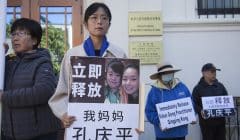China’s Fight With Falun Gong
By Richard C. Morais, Forbes | Jul 31, 2017
The shocking reenactments of torture in front of Pennsylvania Station in New York and the Chinese Embassy in London publicly make the point: Falun Gong, a popular spiritual movement brutally suppressed by the Chinese Communist Party, is effectively waging its counterwar against the Chinese government, from the West.
Overseas Falun Gong practitioners are, for example, leading an underground campaign to hack China’s Internet firewalls to counter the Chinese Communist Party’s news blackout and propaganda in the Middle Kingdom. But there are many skirmishes between Chinese communism and Chinese spiritualism taking place on U.S. soil.
Consider, for example, the propaganda war that took place at New York’s Radio City Music Hall in late January. The New York City-based New Tang Dynasty TV beams uncensored free world news into China using capacity on European satellite-operator Eutelsat. NTDTV is loosely associated with Falun Gong (the spiritual group’s spokeswoman, for example, sits on the company’s board), and NTDTV hired Radio City Music Hall to stage a Chinese New Year gala. Not to be outdone, the Chinese government’s television station, CCTV, booked the famous hall immediately following the NTDTV gala and did its best to confuse the ticket-buying public.
But the Chinese Communist Party-sanctioned gala was built around a ditty called “Same Song,” a sing-along allegedly used during labor camp torture sessions of Falun Gong followers. In response, Falun Gong practitioners used the Torture Victims Protection Act to file suit against CCTV, which the group claims has also been producing false and slanderous propaganda about the “violent” nature of Falun Gong.
Falun Gong members in the West routinely wage telephone campaigns inside China–calling labor camp guards, for example, and urging them to treat imprisoned Falun Gong followers leniently. Last year, however, Falun Gong practitioners worldwide were themselves barraged with harassing phone calls, including death threats. Some of these campaigns involved hours of continuous and simultaneous ringing of work and home phones and private cell phones. Falun Gong is suing the Chinese government in Washington D.C.; they want authority from RICO (the Racketeer Influenced and Corrupt Organizations Act) to get the phone companies to trace these calls back to China.
Overall, says Theresa Chu, a Falun Gong attorney and director of International Advocates for Justice, Falun Gong have filed more than 50 lawsuits across the globe, charging the Chinese Communist Party’s leaders with genocide and other crimes against humanity.
Most outsiders agree that Falun Gong is an essentially benign Chinese spiritual practice. Founded in 1992 by Li Hongzhi, a former Changchun grain clerk, Li’s spiritual teachings are based on the ancient practice of qigong (tai chi is the best known of these movements, which are considered a pillar of ancient Chinese medicine). Li coupled established qigong moves with his own Buddhist-inspired writings, urging practitioners to cultivate “truthfulness, compassion and forbearance.” The Chinese Communist Party initially encouraged the masses to take up Falun Gong, because they saw the practice’s benefits–mental and physical well-being–as a way to curtail the state’s rocketing medical costs.
But paranoia hit when a CCP investigation in the late 1990s estimated that the fast-growing Falun Gong movement had between 70 million and 100 million followers across the country; the CCP itself has only 63 million members. So in July 1999–a few months after a peaceful protest in Beijing by Falun Gong followers–the CCP rounded up the movement’s figureheads throughout the country and began its bloody persecution.
[…]
A few days before the July 1999 crackdown in China, Falun Gong Web sites in Canada and the U.S. began to crash. They couldn’t be brought back online until a week after the bloody crackdown. According to Ethan Gutmann, author of Losing the New China, a Falun Gong practitioner in Washington traced the “denial of service” hacker attacks through an Asia-Pacific Internet registry, to No. 14 East Chang’an Street, Beijing, where China’s Ministry of Public Security is located.
The Chinese government’s persecution of Falun Gong followers is allegedly run by the notorious Office 6-10, a specially created unit that has overseen a terror campaign, which survivors say includes mass arrests, imprisonment in labor camps, brainwashing, torture and, in some cases, murder, for all those who failed to renounce their allegiance to Falun Gong. Gang Chen, a mild-mannered 34-year-old now living in southern New Jersey, tells Forbes that his 17 months in labor camp included many forms of torture, including being chained to a radiator and repeatedly electrocuted with electric batons (“like snake bites”) and being crushed to near-death under wood, as guards ordered fellow inmates to stand on top of him. “My friend was paralyzed this way,” says Chen.
The above are excerpts from the original article published by Forbes.






